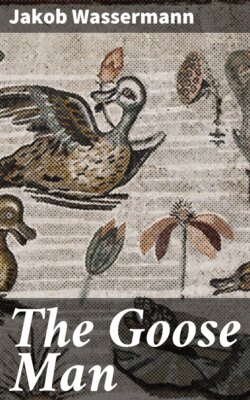Читать книгу The Goose Man - Jakob Wassermann - Страница 13
На сайте Литреса книга снята с продажи.
XI
ОглавлениеTable of Contents
In the beginning Marian had received a letter from Daniel every now and then. These letters became rarer. During the second year he wrote only once—a few lines at Christmas.
At the time when he was leaving his last place of employment he wrote her on a postcard that he was changing his residence again. But he did not tell her that he was going to Nuremberg. So spring passed and summer. Then her soul, which was wavering between fear and hope, was rudely jolted out of its dim state by a letter from Jason Philip.
He wrote that Daniel was loafing about in Nuremberg. Quite by accident he had met him a few days before near the fair booths on Schütt Island. His appearance was indescribable. He had tried to question him, but Daniel had disappeared. What had brought him to the city he, Jason Philip, could not see. But he was willing to wager that at the bottom of it was some shady trick, for the fellow had not looked like one who earns an honest living. So he proposed to Marian that she should come to Nuremberg and help in a raid on the vagabond, in order to prevent the unblemished name he bore from being permanently disgraced before it was too late. As a contribution to her travelling expenses he enclosed five marks in stamps.
Marian had received the letter at noon. She had at once locked up her house and shop. At two o’clock she had reached the station at Ansbach; at four she arrived in Nuremberg. Carrying her hand-bag, she asked her way to Plobenhof Street at every corner.
Theresa sat at the cashier’s desk. Her brown hair on her square peasant’s skull was smoothly combed. Zwanziger, the freckled shop-assistant, was busy unpacking books. Theresa greeted her sister with apparent friendliness, but she did not leave her place. She stretched out her hand across the ink-stand, and observed Marian’s shabby appearance—the worn shawl, the old-fashioned little cloth bonnet with its black velvet ribbands meeting in a bow under the chin.
“Go upstairs for a bit,” she said, “and let the children entertain you. Rieke will bring up your bag.”
“Where is your husband?” asked Marian.
“At an electors’ meeting,” Theresa answered morosely. “They couldn’t meet properly, according to him, if he isn’t there.”
At that moment a man in a workingman’s blouse entered the shop and began to talk to Theresa urgently in a soft but excited voice. “I bought the set of books and they’re my property,” said the man. “Suppose I did skip a payment. That’s no reason to lose my property. I call that sharp practice, Frau Schimmelweis, that’s what I call it.”
“What did Herr Wachsmuth buy of us?” Theresa turned to the shop-assistant.
“Schlosser’s ‘History of the World,’ ” was the prompt answer.
“Then you’d better read your contract,” Theresa said to the workingman. “The terms are all fixed there.”
“That’s sharp practice, Frau Schimmelweis, sharp practice,” the man repeated, as though this phrase summed up all he could express in the way of withering condemnation. “A fellow like me wants to get on and wants to learn something. All right. So I think I’ll buy me a book and get a step ahead in knowledge. So where do I go? To a party member, to Comrade Schimmelweis, thinking natural-like I’m safe in his hands. I pay sixty marks—hard earned money—for a history of the world, and manage to squeeze the payments out o’ my wages, and then, all of a sudden, when half the price is paid, I’m to have my property taken from me without so much as a by your leave just because I’m two payments in arrears.”
“Read your contract,” said Theresa. “Every point is stipulated.”
“No wonder people get rich,” the man went on. His voice grew louder and louder, and he glanced angrily at Jason Philip, who at that moment rushed into the shop with his hat crushed and his trousers sprinkled with mud. “No wonder that people can buy houses and speculate in real estate. Yes, Schimmelweis, I call such things sharp practice, and I don’t give a damn for your contract. Everybody knows by this time what kind of business is done here—more like a man-trap—and that these here instalments are just a scheme to squeeze the workingman dry. First you talk to him about education, and then you suck his blood. It’s hell!”
“Pull yourself together, Wachsmuth!” Jason Philip cried sternly.
Wachsmuth picked up his cap, and slammed the shopdoor behind him.
Marian Nothafft’s eyes passed mechanically over the titles of a row of fiercely red pamphlets spread out on a table. She read: “The Battle that Decides,” “Modern Slaveholders,” “The Rights of the Poor,” “Christianity and Capitalism,” “The Crimes of the Bourgeoisie.” Although these catch-words meant nothing to her, she felt in her heart once more her old, long forgotten hatred against machines.
